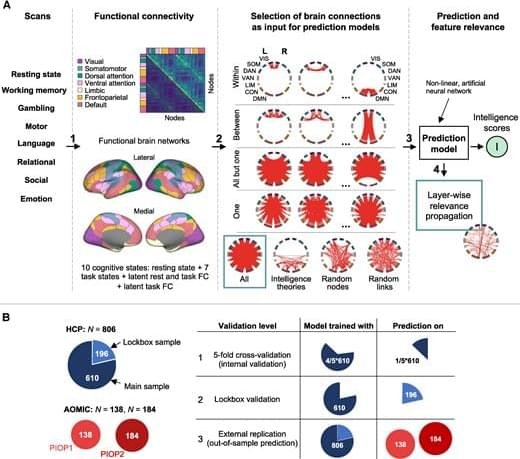Our genetic code works a bit like DALL-E, apparently.





A new photonic chip designed by MIT scientists performs all deep neural network computations optically, achieving tasks in under a nanosecond with over 92% accuracy.
This could revolutionize high-demand computing applications, opening the door to high-speed processors that can learn in real-time.
Photonic Machine Learning

Neuroscientific research on human behavior and cognition has methodologically moved from unimodal explanatory approaches to machine learning-based predictive modeling (1). This implies a shift from standard approaches testing for associations between behavior and single neurobiological variables within one sample (unimodal explanatory research) to the identification of relationships between behavior and multiple neurobiological variables to forecast behavior of unseen individuals across samples (multimodal predictive research) (2). Modern machine learning techniques can learn such general relations in neural data (2, 3) and have consequently become increasingly prominent also in research on fundamental psychological constructs like intelligence (4).
Intelligence captures the general cognitive ability level of an individual person and predicts crucial life outcomes, such as academic achievement, health, and longevity (5, 6). Multiple psychometrical theories about the underlying conceptual structure of intelligence have been proposed. For example, Spearman (7) noticed that a person’s performance on different cognitive tasks is positively correlated and suggested that this “positive manifold” results from an underlying common factor—general intelligence (g). A decomposition of the g-factor into fluid (gF) and crystallized (gC) components was later proposed by Cattell (8, 9). While fluid intelligence is assumed to mainly consist of inductive and deductive reasoning abilities that are rather independent of prior knowledge and cultural influences, crystallized intelligence reflects the ability to apply acquired knowledge and thus depends on experience and culture (10).
Neurobiological correlates of intelligence differences were identified in brain structure (11) and brain function (12). However, rather than disclose a single “intelligence brain region”, meta-analyses and systematic reviews suggest the involvement of a distributed brain network (13–15), thus paving the way for proposals of whole-brain structural and functional connectivity (FC) underlying intelligence (16, 17). While the great majority of such studies used an explanatory approach, recently, an increasing number of machine learning-based techniques were developed and applied to predict intelligence from brain features (4, 18, 19). Although intrinsic FC measured during the (task-free) resting state has enabled robust prediction of intelligence (19), prediction performance can be boosted by measuring connectivity during task performance (18, 20).

Finding a reasonable hypothesis can pose a challenge when there are thousands of possibilities. This is why Dr. Joseph Sang-II Kwon is trying to make hypotheses in a generalizable and systematic manner.
Kwon, an associate professor in the Artie McFerrin Department of Chemical Engineering at Texas A&M University, published his work on blending traditional physics-based scientific models with experimental data to accurately predict hypotheses in the journal Nature Chemical Engineering.
Kwon’s research extends beyond the realm of traditional chemical engineering. By connecting physical laws with machine learning, his work could impact renewable energy, smart manufacturing, and health care, outlined in his recent paper, “Adding big data into the equation.”
“The next wave of AI will be able to augment people to become superhuman. Solutions will be at the ready for nearly all problems facing humanity.” ~Alex Bates.
Habits2Goals presents a powerful interview with Alex Bates, a phenomenal entrepreneur, inventor and bestselling author of Augmented Mind: AI Superhumans and the Next Economic Revolution.
When Alex was growing up in Portland, battling for computer time with his siblings, he developed an obsession with the emerging Internet and artificial neural networks.
Alex, fascinated by entrepreneurship, took his interest in AI and machine learning and in 2006 founded Mtelligence to harness the deluge of sensor data in the industrial IoT with the mission of creating a “world that doesn’t break down.”
After spending a decade on the front lines of the AI revolution, Alex discovered the one key ingredient that was missing from mainstream AI research — humans!
His new book explains how augmenting humans, combining human intuition and artificial intelligence, will herald an unprecedented era of productivity and financial success.
This episode is sponsored by Legal Zoom.
Launch, run, and protect your business to make it official TODAY at https://www.legalzoom.com/ and use promo code Smith10 to get 10% off any LegalZoom business formation product excluding subscriptions and renewals.
In this episode of the Eye on AI podcast, we dive into the world of Artificial General Intelligence (AGI) with Ben Goertzel, CEO of SingularityNET and a leading pioneer in AGI development.
Ben shares his vision for building machines that go beyond task-specific capabilities to achieve true, human-like intelligence. He explores how AGI could reshape society, from revolutionizing industries to redefining creativity, learning, and autonomous decision-making.
Throughout the conversation, Ben discusses his unique approach to AGI, which combines decentralized AI systems and blockchain technology to create open, scalable, and ethically aligned AI networks. He explains how his work with SingularityNET aims to democratize AI, making AGI development transparent and accessible while mitigating risks associated with centralized control.
Ben also delves into the philosophical and ethical questions surrounding AGI, offering insights into consciousness, the role of empathy, and the potential for building machines that not only think but also align with humanity’s best values. He shares his thoughts on how decentralized AGI can avoid the narrow, profit-driven goals of traditional AI and instead evolve in ways that benefit society as a whole.

